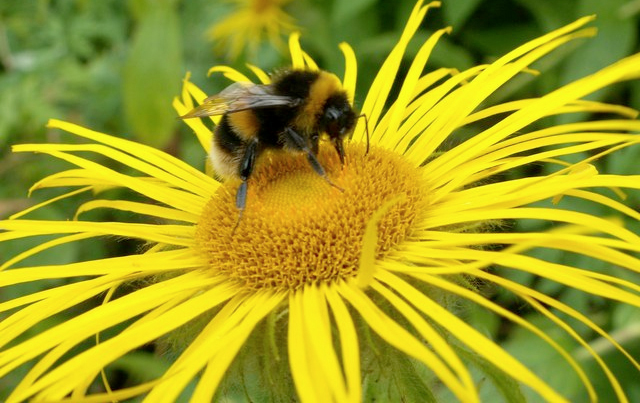
An already declining bee population could be dealt further blows if cuts to greener farming projects are made at the EU summit.
EU leaders are meeting to decide on funding for the bloc, including payments to farmland schemes.
As part of the Common Agricultural Policy, the payments are the biggest source of money available to farmers to help them protect and improve wildlife in Britain.
The charity Friends of the Earth has said the scheme is 'crucial' for protecting farm habitats and other wildlife including bees.
There are estimated to be up to 44,000 beekeepers in the UK, of which more than 99 per cent are amateurs.
"Slashing green farming funds would be a vicious blow for Britain’s declining bee populations" said Paul de Zylva, a campaigner for the charity.
"Bees are crucial for pollinating our crops, but numbers are falling at a terrifying rate, compounded by chemicals, habitat loss and lack of research."
"Just as Europe appears to be waking up to the threat posed by pesticides to bees, it’s at risk of making the crisis worse by failing to support a shift to wildlife-friendly farming."
The amount of money assigned to the Common Agricultural Policy (CAP) and a number of policy concerns relating to the future CAP are among the issues to be discussed at the summit.
"We have said all along that it would be unrealistic for us to expect the CAP to be exempt from the austerity measures that are being applied throughout the European Union" said NFU director of policy Martin Haworth in Brussels.
"What is key to us is that whatever settlement is finally reached, the terms and conditions applied to our farmers must not put us at a disadvantage with our major competitors."
Greening
The centerpiece of CAP reform remains the greening of direct payments.
New environmental rules - which will make 30% of national budgets for direct payments conditional upon compliance with greening measures - must be made more flexible, the MEPs said.
There were three key measures: crop diversification, maintaining permanent pasture and creating ecologically focused areas will remain but with exceptions.
MEPs made clear that farms with under 10 ha of arable land should be exempt and the rules should be relaxed for holdings of 10 - 30 ha.
"We asked MEPs to make the greening proposals more workable and to ensure that the efforts of farmers already in agri-environment schemes was taken into consideration. We asked that if a farmer chose not to do the greening requirements, that he would only lose his greening payment" said Deputy President of the NFU Meurig Raymond.
"We asked for changes to the way in which entitlements will operate in the future CAP and a properly functioning national reserve."
Government measures
Recently, new plans to prevent a declining bee population by protecting hives from pests and diseases were unveiled by the government.
Defra outlined proposals which help beekeepers to identify and manage pests such as the potentially devastating Varroa mite, considered the single greatest problem for beekeepers.
A consultation was published seeking views from amateur keepers and commercial bee farmers on how best to provide more support to improve honey bee health.
"Honeybees are an iconic species which are vital to the environment and I want to make sure that we do all we can to safeguard their future" said Animal Welfare minister Lord de Mauley.
"But these bees are susceptible to pests and diseases and need to be cared for properly to aid their long-term survival, which is why we’re consulting on new measures to help beekeepers and improve bee health."
The proposals include increased effort to tackle the management of the Varroa mite, rewarding bee farmers showing good management of their hives and a new welfare code to remind beekeepers of their responsibilities.
The new plans were drawn up by beekeeping experts including representatives from Defra and the Welsh Government, the NBU, the British Beekeepers Association the Bee Farmers Association and the Welsh Beekeepers Association.
